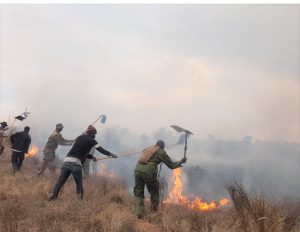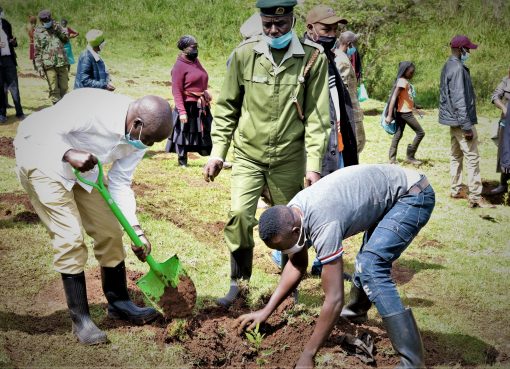Kenya Wildlife Service (KWS) firefighters were on Thursday racing against time to contain raging fires that have destroyed hundreds of acres of Tsavo West National Park and threatens the delicate ecosystem of this iconic park.
The firefighters, backed by local administration, residents of Maktau location, National Youth Service (NYS) recruits and several police officers, have been battling the inferno since Tuesday night. The cause of the fire is yet to be established. However, firefighting efforts have borne little fruits as the inferno continues to burn unrelentingly destroying hundreds of acres of grass, shrubs and other vegetation. There have not been reports of animal casualty.

Mwatate Deputy County Commissioner Damaris Kimondo said the fires had earlier destroyed several acres of dry grass in some ranches bordering the park. Speaking to KNA on Thursday, the administrator revealed that officials from various agencies had joined in the fight to put out the flames. Local residents from villages near the park were also assisting in putting out the flames.
“Ranches near the park lost part of their pastures to fires before they managed to put it out. We have now mobilized teams to put out the flames inside the park,” she said.
Some of the ranches that lost pasture to the fire outbreak include Oza, Mgeno, Luarenyi, Taita and Rukinga ranch. Mr. Bong’osa Mcharo, the chair of Taita-Taveta Wildlife Conservancy Association, said there were no livestock casualties. He however said ranchers remained apprehensive over the effect of the fire and warned that any more outbreak would lead to acute shortage of pastures for thousands of livestock.
“The grass is very dry and if there is another fire outbreak, we will not have anything for our livestock,” he said.
The fires in the ranches were contained. However, the blaze in the park keep burning fiercely raising fears of a large-scale ecological destruction. There are emerging different accounts on how the fire started. While one version claims the fire started inside the park after KWS launched a massive operation to drive illegal herders from the park on Tuesday night, another version says the fire started in one of the ranches adjacent to the park and rapidly spread into the park due to the strong winds.
Efforts to contact Mr. Robert Njue, Assistant Director, Tsavo Conservation Area, were futile. However, KWS through a brief press release on Thursday said there were three sets of fires reported in Tsavo Conservation Area. One was in the ranches neighboring the park and another fire was in the Southern Part of Tsavo West. The third outbreak was reported at Kikunduku part of Chyullu Hills National Park.
Concerns are being raised over the frequent fire reports inside the park. The current fire incidence is the third to be reported in Tsavo National Park within the last three months. In May, 4,000 acres were destroyed by fire in Tsavo East National Park while another fire in June destroyed an additional 180 acres.
In the past fires, teams were able to contain the inferno within a day after the outbreak. However, the current inferno sweeping through Tsavo West National Park has proved to be a monumental challenge as the powerful winds and thick dry grass have made it impossible to effectively contain the fires.
At one time on Wednesday, the fires became so fierce the firefighting teams were asked to retreat to avoid heat stroke, injuries or worse. There are fears this fire, if not put out, might destroy a larger area than the previous fires.
Amid this gloom, Mwakitau location residents are being hailed as the unlikely heroes of this tragedy. Since Tuesday, hundreds of local residents have abandoned their domestic duties to fight the fires alongside KWS teams. After assisting in putting out the fires in some of the ranches, they are also supporting to battle the park fires.
Residents however have expressed fears over a likely surge in cases of human-wildlife conflict as wild animals flee the fires into human settlement areas. Mr. Bristone Mwazighe, chair of Oza Conservancy, said hyenas, elephants, buffaloes and lions might move into the villages to escape the fire. He also added that snakes would move into homes and asked residents to be cautious.
“We are expecting reports of conflict as wild animals flee from the fires. They will come into villages and we hope KWS will act before that happens,” he said.
Conservation groups operating in the region have started appealing for donations to help fight the fires.
By Wagema Mwangi





